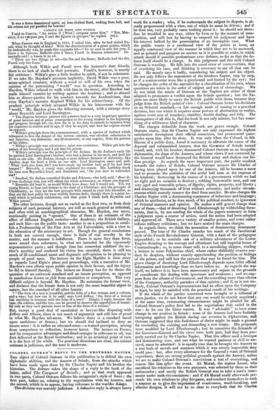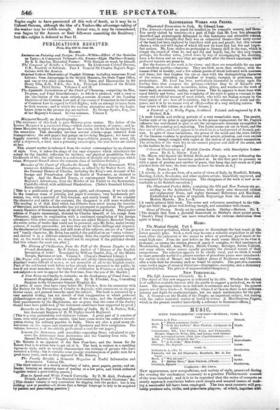COLONEL OUTRAM'S REPLY TO THE BROTHERS NAPIER.
Tun object of Colonel Qatram in this publication is to defend his own diplomatic abilities, and the Ameers of Scinde, from the attacks which have been made upon them by Sir Charles Napier and his brother the historian. The defence takes the shape of a reply to the book of the latter, called The Conquest of Scuttle ; and as that work appeared in two parts, Colonel Outram follows his antagonist's style of fence ; the first part, before us, relating to the negotiations with the Ameers, and the second, which is to appear, having reference to the warlike doings.
This division was scarcely judicious. A defensive reply is always heavy
work for a reader • who, if he understands the subject in dispute, is al- ready prepossessed with a view, out of which he must be driven ; and if he does not, very probably cares nothing about it : he should not there- fore be troubled in any way, either by form or by the manner of com- position, and still less by having to suspend his judgment and have his interest balked by the presentation of an incomplete case. What the public wants is a condensed view of the points at issue, an equally condensed view of the manner in which they are to be answered, and as pointed and pungent an answer as it is possible to make, in which attack should if possible predominate over defence, so far as that the de- fence itself should be a charge. In this judgment and this skill Colonel Outram is wanting. He falls into the usual error of controvertists, that of overdoing his case, and thinking it necessary to say all that can be said. He mostly says it badly, considering his subject and his object. He not only follows the statements of the brothers Napier, step by step, as if a contrOvertist were like a greyhound and hunted by the eye; but he changes the order of the narrative for a classification of his own, where questions are taken in the order of subject and not of chronology. We do not think the minds of Outram or the Napiers are either of them adapted to pronounce a verdict upon the Scinde question ; but the Na- piers are more likely to carry the British public with them, because they judge from the British point of view : Colonel Outram forms his decisions on an Oriental standard,—a fair enough mode of coming to a practical decision, but one which it requires some powers of abstraction to realize, against overt acts of treachery, timidity, double dealing, and folly. The consequence of all this is that the book is not only minute, but has some- thing of a wilderness kind of character.
The charges deducible from the work are grave enough. Colonel Outram states, that Sir Charles Napier not only expressed the highest satisfaction throughout their official connexion, but pronounced pane- gyrics upon him after its close. It was only when the Colonel, in fit!- fitment of a public duty, found it necessary to advocate the cause of the deposed and calumniated Ameers, that the Governor of Scinde turned round, and, with his brother, denounced Colonel Outram as an incapable diplomatist, the dupe of the Ameers, and whose views if not corrected by the General would have destroyed the British army and shaken our dian prestige. As regards the more important part, the public conduct towards the rulers of Scinde, Colonel Outram accuses Sir Charleti of having been played upon by one of the Ameers, till he became a mere tool to promote the ambition of this artful bad man at the expense of his kindred; destroying in the course of it a government which we had no right and no occasion to destroy ; robbing honourable men, and one very aged and venerable prince, of dignity, rights, property, and liberty ; and destroying thousands of lives without necessity, and under circum- stances which scarcely remove the deed from murder. He also charges Sir - Charles Napier with a domineering coarseness of behaviour and language; which he attributes, as he does much of his political conduct, to ignoranee, of Oriental manners and opinion. He makes a still graver charge than any' of these,—that of deceiving Lord Ellenborough by withholding docu- ments, that is, by not sending the whole of the papers necessary to form' a judgment upon a course of action, until the action had been adopted and approved of. There are a variety of smaller points, and some rather tedious military criticisms ; but we have noticed the main charges.
As regards these, we think the accusation of domineering demeanour proved. The tone of Sir Charles smacks too much of the Jaoobinical style of the French Revolutionary General, with a dash of the pedagogue superadded ; or he reminds one of a military adventurer of the Lower Empire dictating to the corrupt and effeminate but still imperial house of Constantinople; or, to come closer stilt, to a moralizing skipper, reading a lecture to some Polynesian chief, whose rather childishly evasive con- duct he despises, without exactly apprehending the position or feelings of the prince, and still less the excuses that may be found for him. The grave charge of deceiving Lord Ellenborough depends upon fuller official information and knowledge than we have before us. As regards the war itself, we believe it to have been unnecessary and unjust on the grounds of considerate fair dealing with ignorance and weakness ; and we sup- pose from the silence of Government, and the something more than silence of the Company, authority partakes of that opinion ; and if, as is not un- likely, Colonel Outram's representations had an effect upon the Company at least, he may be satisfied with the practical result of his writings.
If the whole of the parties concerned were brought to a tribunal of stern justice, we do not know that any one would be exactly acquitted ; at the same time, extenuating circumstances might be pleaded for all. Colonel Outram's policy first led to the negotiations that ended in the war : he let out the bitter waters. It was "advisable" to have some change in our position in Scinde : some of the Ameers had been foolishly intriguing against the British during our reverses iu Afghanistan, and Outram suggested that this foolishness of theirs might be made a ground for rescinding the existing and demanding a new treaty. His proposals were modified by Lord Ellenborough ; but he conceives the demands of the Governor-General and his views were both just, had they been pro- perly carried out by Sir Charles Napier. That this officer used a brusque and domineering tone and cut what he wanted patience or skill to un- ravel, must be admitted: it is equally true that he brought the Ameera to a test both of morals and manners which it was utterly impossible they could pass : but, after every allowance for the General's want of Oriental experience, there are strong political grounds against the Ameers, unless we are to make Colonel Outram's convictions a test of everything, and reason like him after the event. All Morad, the traitor Ameer, who sacrificed his relations to his own purposes, was selected by them as their ambassador ; and surely the British General was to take a man's state- ments under such circumstances : and if All Morad could afterwards per- suade his own relations to play his game, and conduct themselves in such a manner as to give the impression of evasiveness, word-breaking, and ulterior designs, it will not be so clear to everybody that Sir Charles
Napier ought to have penetrated all this web of deceit, as it may be to Colonel Outram, although the idea of a Yankee-like advantage-taking of the weaker may be visible enough. Actual war, it may be remembered, was begun by the Ameers or their followers assaulting the Residency : bat tbie stiblect is deferred to Part IL



















































 Previous page
Previous page